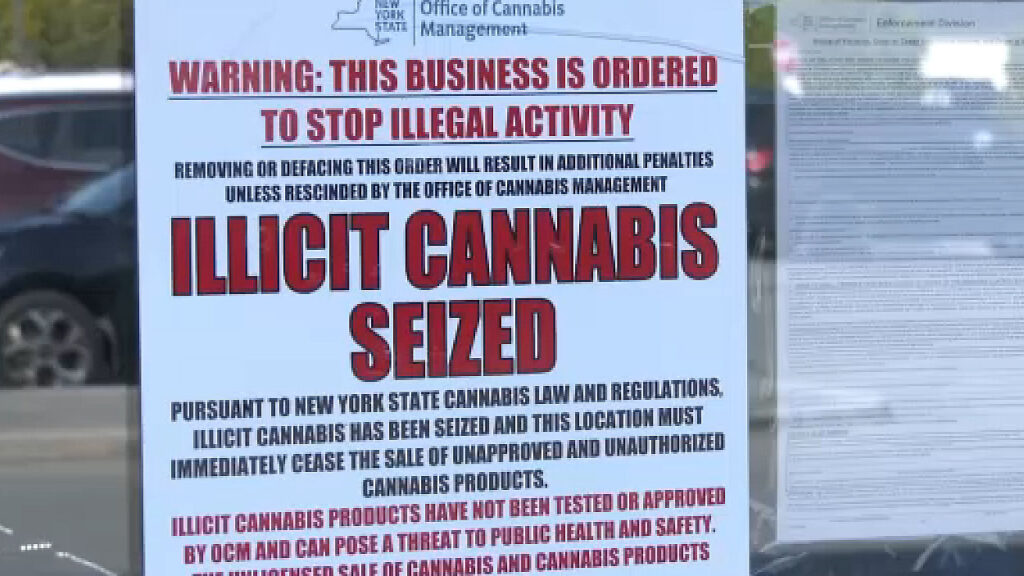Several state-licensed hemp retailers say police improperly seized thousands of dollars of legal cannabis products from their shelves or padlocked their stores this summer in raids intended to crack down on illicit marijuana sales. The state Supreme Court is expected to make a decision in their civil suit against the state Office of Cannabis Management by the end of the year. (Tom Connolly/Spectrum News 1)
Several hemp retailers in the state who say they’ve been improperly accused of selling illegal marijuana products have high hopes for a state Supreme Court decision expected by the end of the month.
Hemp store owners this summer sued the state Office of Cannabis Management after police confiscated thousands of dollars of product they argue they’re legally licensed to sell through the state agency.
Both hemp and marijuana flower are cannabis products that look and smell identical. Federal law allows the sale of hemp products with 0.3% or less of the cannabinoid Delta-9 THC, or the chemical compound that makes a user feel high.
But a discrepancy in state law has created a gray area for police and state inspectors to distinguish hemp stores from illicit marijuana shops — leaving hemp retailers caught in the crossfire.
“Hemp is cannabis, marijuana is cannabis,” said attorney Josh Bauchner, who represents the hemp licensees. “But the state says that if we call hemp ‘cannabis,’ just that label is illegal.”
The lawsuit in state Supreme Court alleges the state’s enforcement regulations are unconstitutional, and fail to give New Yorkers due process when they’re accused of illegally selling marijuana and before they’ve had a hearing.
“You cannot be labeled a criminal without due process,” Bauchner said.
The suit also challenges police and OCM applying regulations intended for people selling marijuana without a license to state-issued hemp licensees.
“The city and state laws grant the OCM or sheriff the authority to engage in enforcement activity against nonlicensees,” Bauchner explained, adding they legally cannot be applied to New Yorkers with a state-issued cannabis license.
A judge is expected to make a decision by the end of the year.
About $15 million in this year’s state budget expanded OCM’s enforcement arm to crack down on thousands of operating illegal marijuana stores and allow local police to padlock them shut.
Tyler Lehmann, president and CEO of Breckenridge Hemp, said New York City sheriffs confiscated over $130,000 of product from his legally licensed hemp store in Midtown, Manhattan, and padlocked it closed this summer.
The New York City owner of two hemp stores said police also flushed products down the toilet during an inspection at his other location in Brooklyn.
“They just padlocked the doors and you’re out of business, and no lab testing, you’re just guilty,” Lehmann said Tuesday. “It doesn’t matter if you used the wrong word, you’re guilty and I’m just at a loss for words.”
State law does not require products be tested before they get confiscated.
The state Office of Cannabis Management has conducted 1,057 regulatory enforcement inspections since May, including 425 that were padlocked by local law enforcement, according to the department.
“We do no need to test because the law explicitly states that the products just need to be marketed and labeled as ‘cannabis,'” OCM spokesperson Taylor Randi said in a statement.
The discrepancy is a problem with licensed hemp retailers across the state — and not just in New York City where illegal stores remain the most prevalent.
“I have clients where the summons has been dismissed, they’ve effectively been found to not have committed any illegality and their stores are still sealed with that big incendiary sign and the padlock and they can’t gain access,” Bauchner said.
Charlene Harris owns two locations of Super Smoke N Save in Saratoga Springs and Queensbury. She has had a state-issued license to sell hemp since 2021.
She said county police raided her Saratoga Springs store and seized about $8,000 worth of hemp product earlier this summer.
Police did not padlock the store, but posted an “illegal cannabis seized” sign on the door that continues to be displayed on the front of the building.
“I have a sticker on my window that says I was selling illicit cannabis… Illicit means tax wasn’t paid,” Harris said. “I’ve never sold marijuana or anything that wasn’t federally legal.”
Harris recounted that about a dozen OCM staffers helped police inspect products, and did not care she had verified lab certifications proving the products were cannabis hemp, or under 0.3% THC.
And even months later — the sign continues to impact business.
“We do have people come up to the window all the time and just see that [poster] and turn around and leave,” Harris said. “It’s really hurt this shop. We’re thankful we weren’t padlocked, but just the fact they would have the authority to do that without testing the product to ensure it’s actually illegal? That’s ridiculous to me.”
Harris said New York’s continued mistakes with the rollout of the state’s legal marijuana industry has forced police and OCM to do damage control at hemp retailers’ expense.
“They’re just so gung-ho because of their big fumbled rollout of the legal market,” Harris said. “Innocent business people are paying the price for that. And that’s just not fair.”
Bauchner represents hemp store owners across upstate in many civil cases who claim they have been improperly penalized for selling marijuana, including in Geneseo and Middletown.
The state Office of Cannabis Management does not comment on pending litigation.



